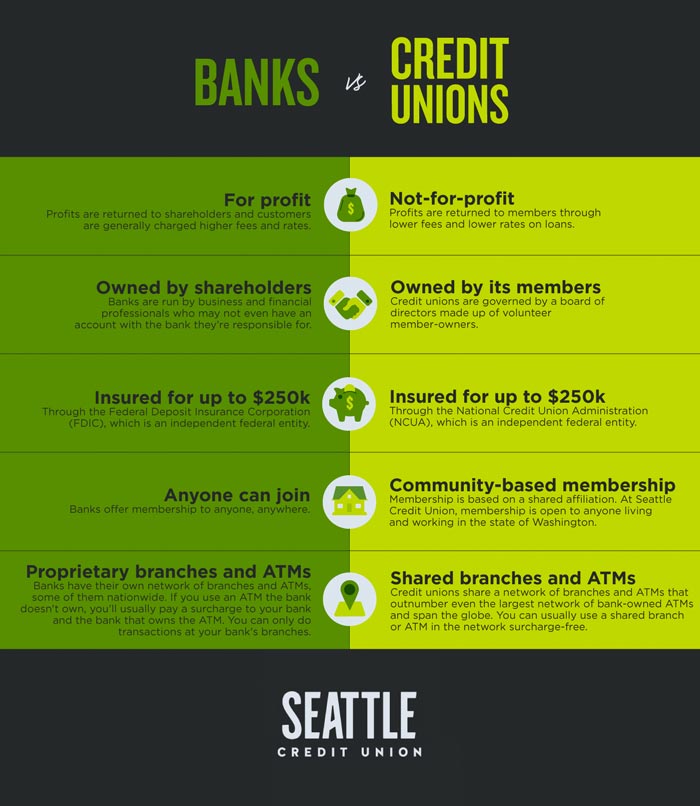Hybrid Line of Credit: Flexible Funding Options from Your Wyoming Credit Union
Hybrid Line of Credit: Flexible Funding Options from Your Wyoming Credit Union
Blog Article
The Ultimate Guide to Comprehending Lending Institution

Credit score unions stand as special monetary entities, rooted in principles of common assistance and member-driven procedures. Nevertheless, beyond their fundamental values, comprehending the elaborate operations of cooperative credit union entails a deeper exploration. Untangling the complexities of membership qualification, the development of solutions provided, and the distinctive benefits they bring needs a comprehensive exam. As we navigate with the details of cooperative credit union, an informative journey awaits to clarify these member-focused institutions and exactly how they vary from conventional financial institutions.
What Are Lending Institution?
Cooperative credit union are member-owned financial organizations that provide a series of financial solutions to their members. Unlike conventional banks, cooperative credit union operate as not-for-profit companies, indicating their main focus is on serving their participants instead than optimizing revenues. Participants of a credit score union generally share a common bond, such as working for the same company, coming from the very same area, or becoming part of the very same company.
One of the essential advantages of lending institution is that they commonly offer greater interest rates on interest-bearing accounts and lower rate of interest prices on fundings contrasted to financial institutions. Wyoming Credit Union. This is due to the fact that lending institution are structured to benefit their participants straight, permitting them to hand down their earnings in the form of much better prices and less costs. Additionally, debt unions are recognized for their customized customer care, as they focus on constructing relationships with their members to comprehend their special economic demands and objectives
Background and Evolution of Credit Unions
The roots of member-owned financial cooperatives, recognized today as credit rating unions, trace back to a time when areas sought options to conventional banking institutions. The concept of cooperative credit union come from the 19th century in Europe, with Friedrich Wilhelm Raiffeisen usually credited as the leader of the participating financial motion. Raiffeisen established the first acknowledged cooperative credit union in Germany in the mid-1800s, highlighting neighborhood support and self-help concepts.
The advancement of lending institution proceeded in North America, where Alphonse Desjardins established the initial cooperative credit union in copyright in 1900. Quickly after, in 1909, the very first U.S. lending institution was created in New Hampshire by a group of Franco-American immigrants. These very early credit unions run on the essential principles of shared assistance, autonomous control, and member ownership.
Gradually, lending institution have grown in appeal worldwide due to their not-for-profit framework, concentrate on offering members, and using competitive economic products and solutions. Today, credit report unions play an important function in the economic industry, supplying community-oriented and obtainable banking choices for services and people alike.

Membership and Qualification Criteria
Subscription at a cooperative credit union is normally restricted to individuals fulfilling particular qualification requirements based upon the establishment's founding concepts and regulative requirements. These standards commonly include variables such as geographic place, work status, subscription in certain organizations, or association with particular teams. Cooperative credit union are recognized for their community-oriented approach, which is shown in their subscription needs. Credit Union in Wyoming. As an example, some lending institution might only serve individuals who function or live in a specific area, while others may be customized to employees of a specific firm or participants of a particular get more association.
Furthermore, cooperative credit union are structured as not-for-profit companies, implying that their key objective is to serve their participants instead of produce profits for investors. This emphasis on member solution often translates right into more customized attention, reduced charges, and affordable rate of interest rates on cost savings and car loans accounts. By meeting the qualification requirements and coming to be a participant of a lending institution, people can access a variety of financial product or services tailored to their specific requirements.
Services and Products Used
One of the key aspects that sets credit rating unions apart is the diverse range of financial solutions and products they provide to their members. Credit history unions commonly give standard financial services such as savings and checking accounts, finances, and debt cards.
Moreover, lending institution typically provide hassle-free online and mobile financial choices for members to conveniently manage their finances. They might use benefits such as common branching, enabling members to access their accounts at other cooperative credit union across the nation. Some credit report unions also offer insurance coverage items like auto, life, and home insurance to aid members secure their possessions and enjoyed ones.

Advantages of Financial With Lending Institution
When taking into consideration banks, checking out the advantages of financial with lending institution exposes unique advantages for participants seeking personalized solution and competitive rates. One substantial benefit of cooperative credit union is their concentrate on customized consumer solution. Unlike big financial institutions, cooperative credit union are member-owned and focus on structure strong connections with their participants. This means that lending institution team typically have a much deeper understanding of their participants' financial requirements and can supply customized services to assist them attain their objectives. anonymous Additionally, cooperative credit union are known for providing affordable rate of interest on savings and loans accounts. Since they are not-for-profit companies, credit scores unions can commonly give reduced lending prices, greater financial savings prices, and reduced fees compared to conventional financial institutions. This can result in significant cost savings for members in time. Generally, banking with a cooperative credit union can provide a much more customized, cost-efficient, and member-centric economic experience.
Final Thought
In final thought, lending institution stand apart as member-owned banks that focus on serving their participants over making best use of revenues. With beginnings dating back to 19th century Europe, cooperative credit union adhere to principles of common support and participant possession. They provide a variety of financial services and items, consisting of conventional financial solutions, click for more financial investment options, and affordable rate of interest. Subscription eligibility criteria specify and mirror a community-oriented strategy, giving personalized customer care and a member-centric economic experience.
Credit score unions are member-owned economic establishments that supply an array of financial services to their members. The idea of debt unions originated in the 19th century in Europe, with Friedrich Wilhelm Raiffeisen frequently credited as the pioneer of the cooperative financial activity.The evolution of credit history unions proceeded in North America, where Alphonse Desjardins developed the very first credit report union in copyright in 1900. Credit unions typically provide typical financial services such as savings and examining accounts, lendings, and credit history cards.When considering economic establishments, checking out the benefits of banking with credit history unions reveals one-of-a-kind benefits for participants seeking personalized solution and affordable rates.
Report this page